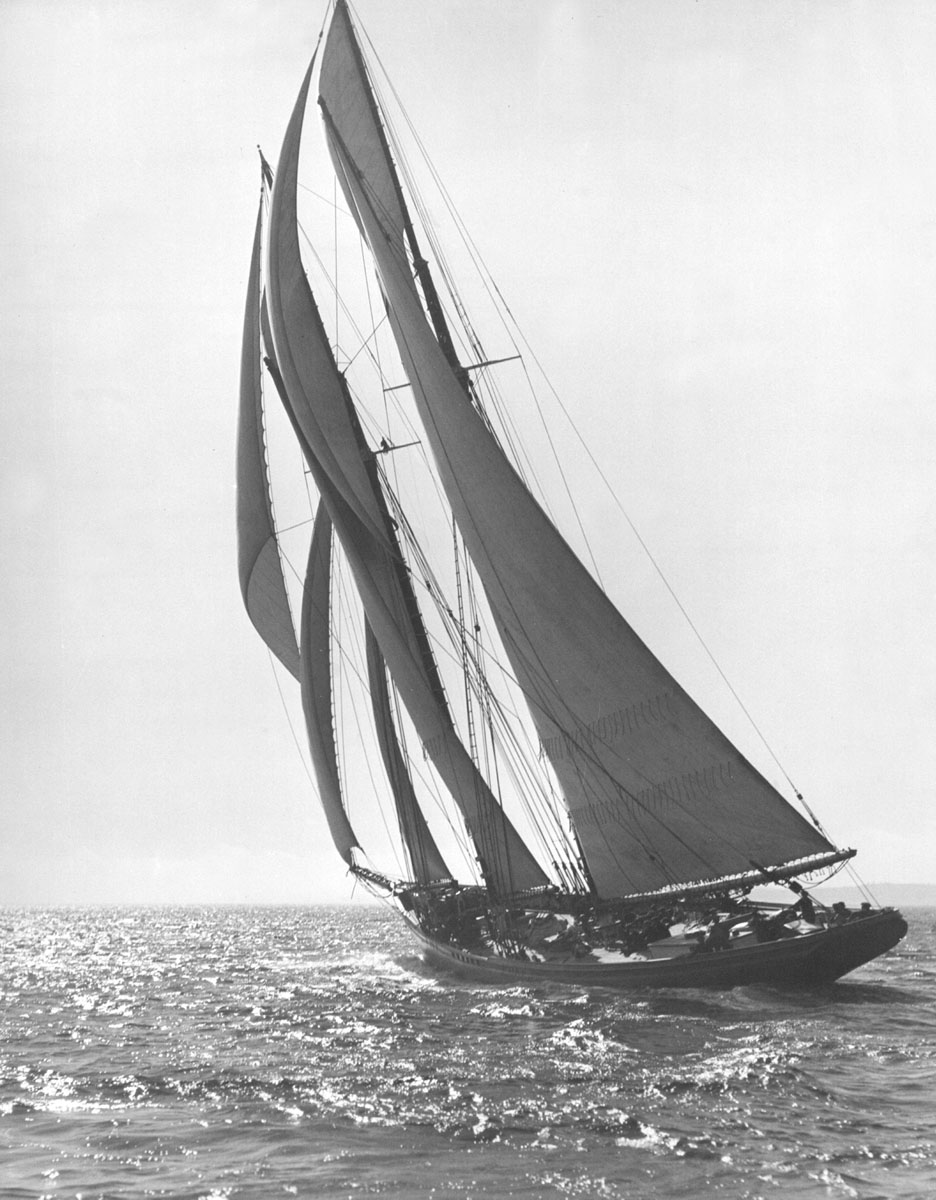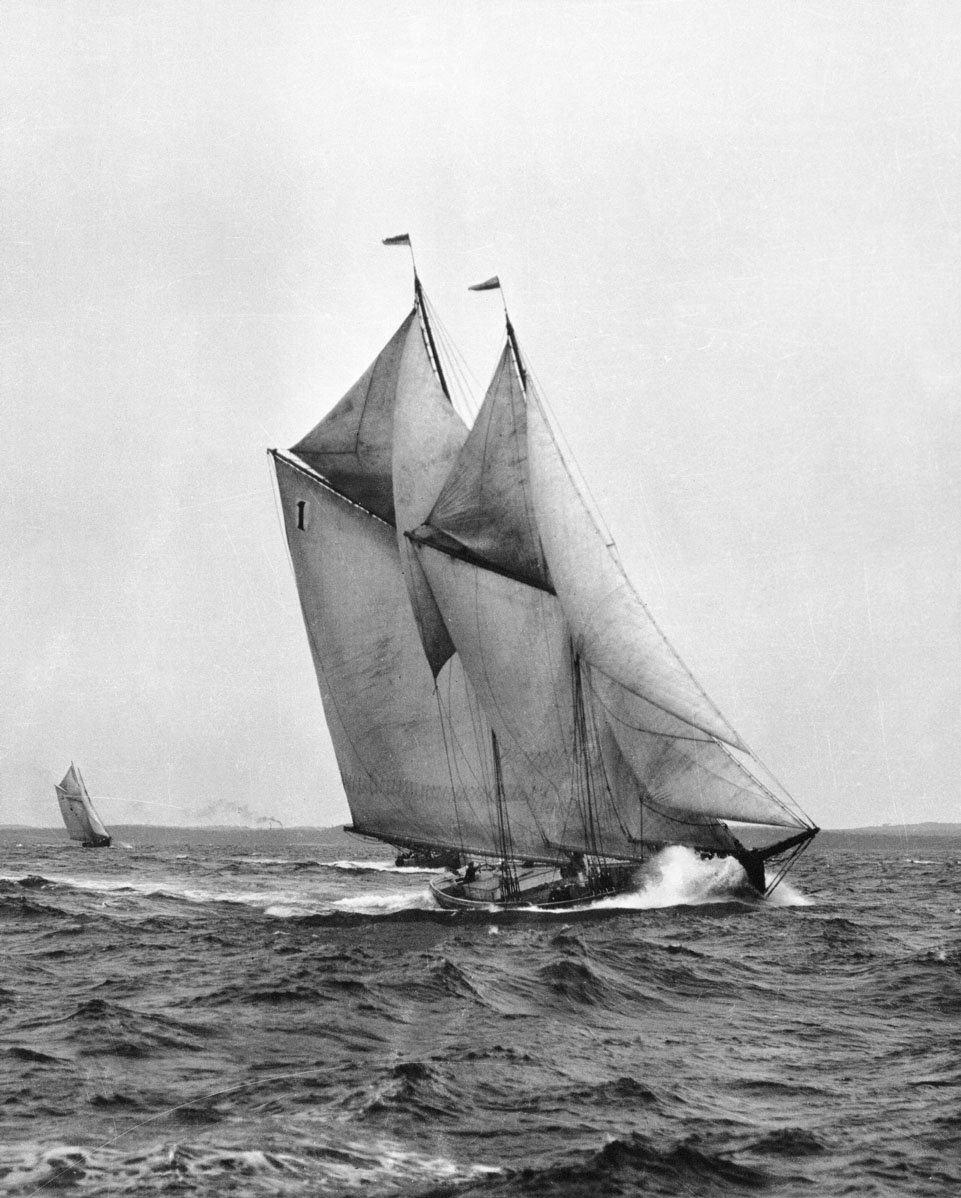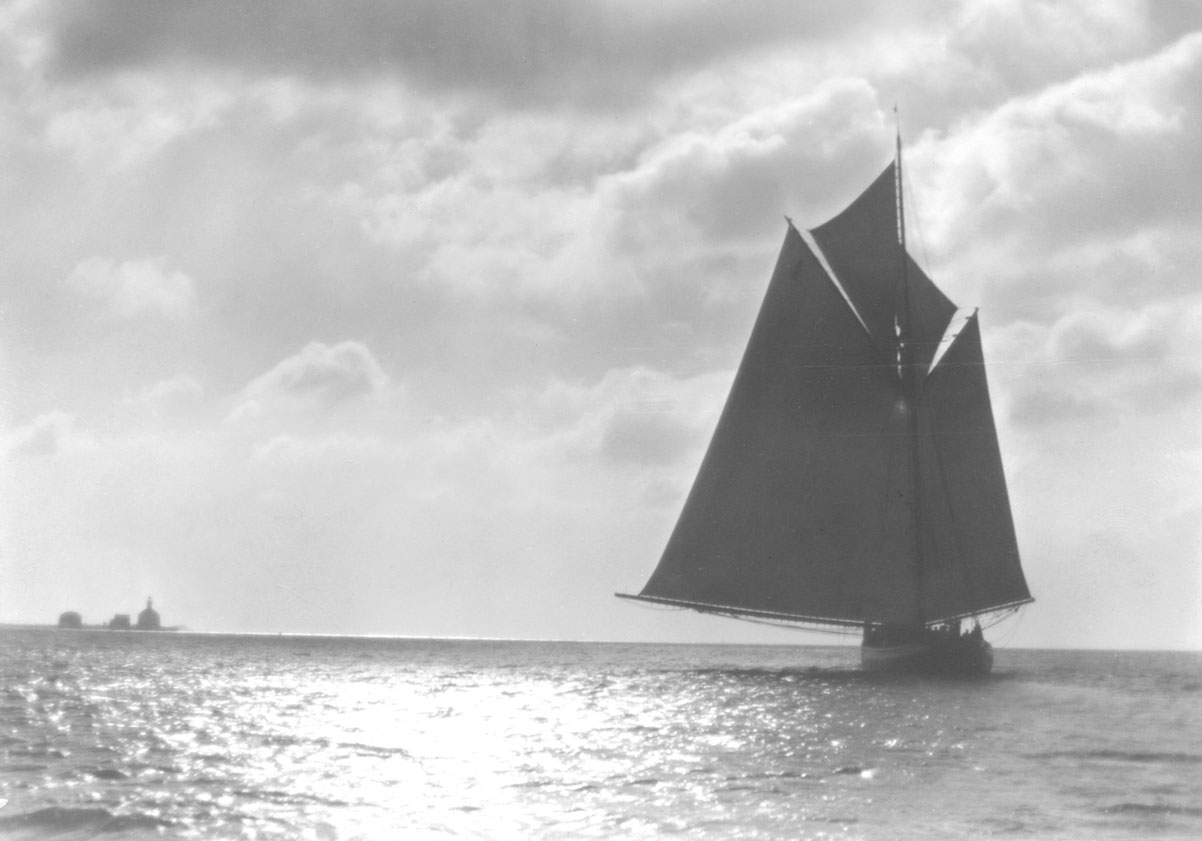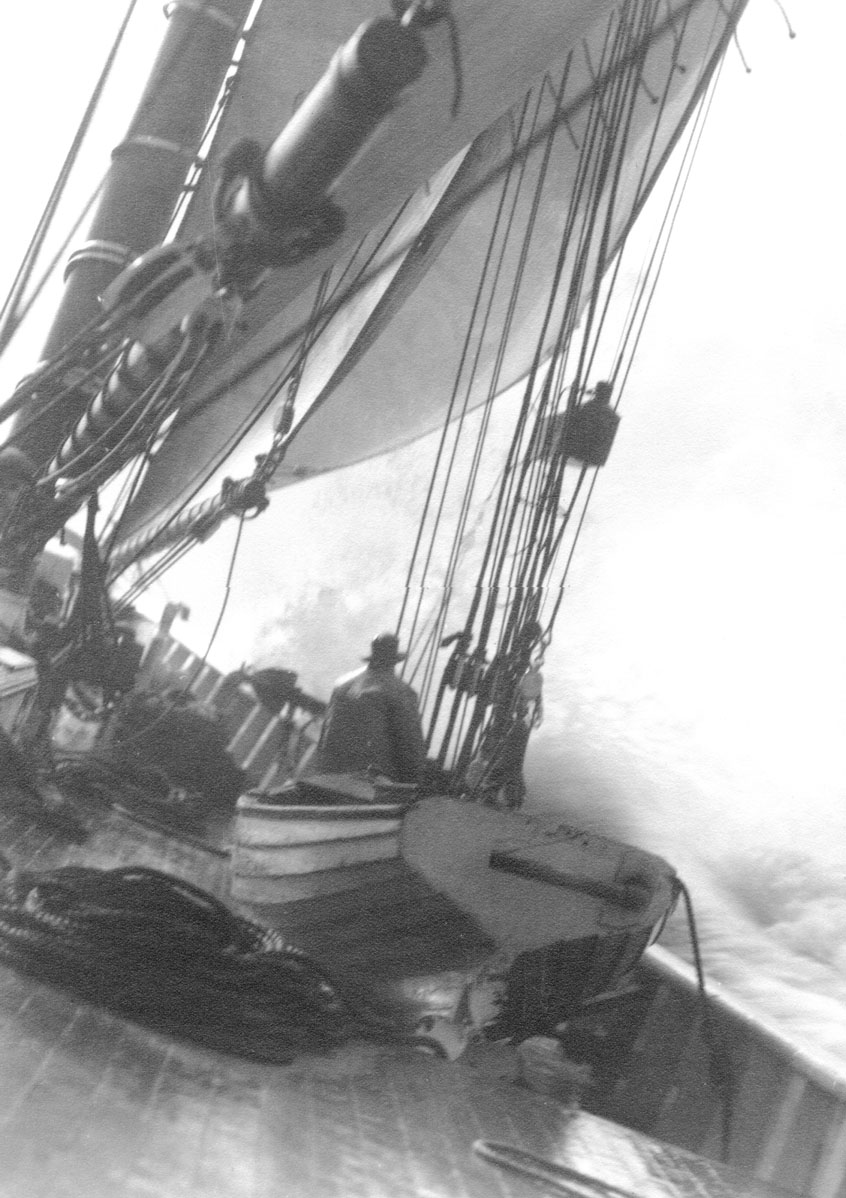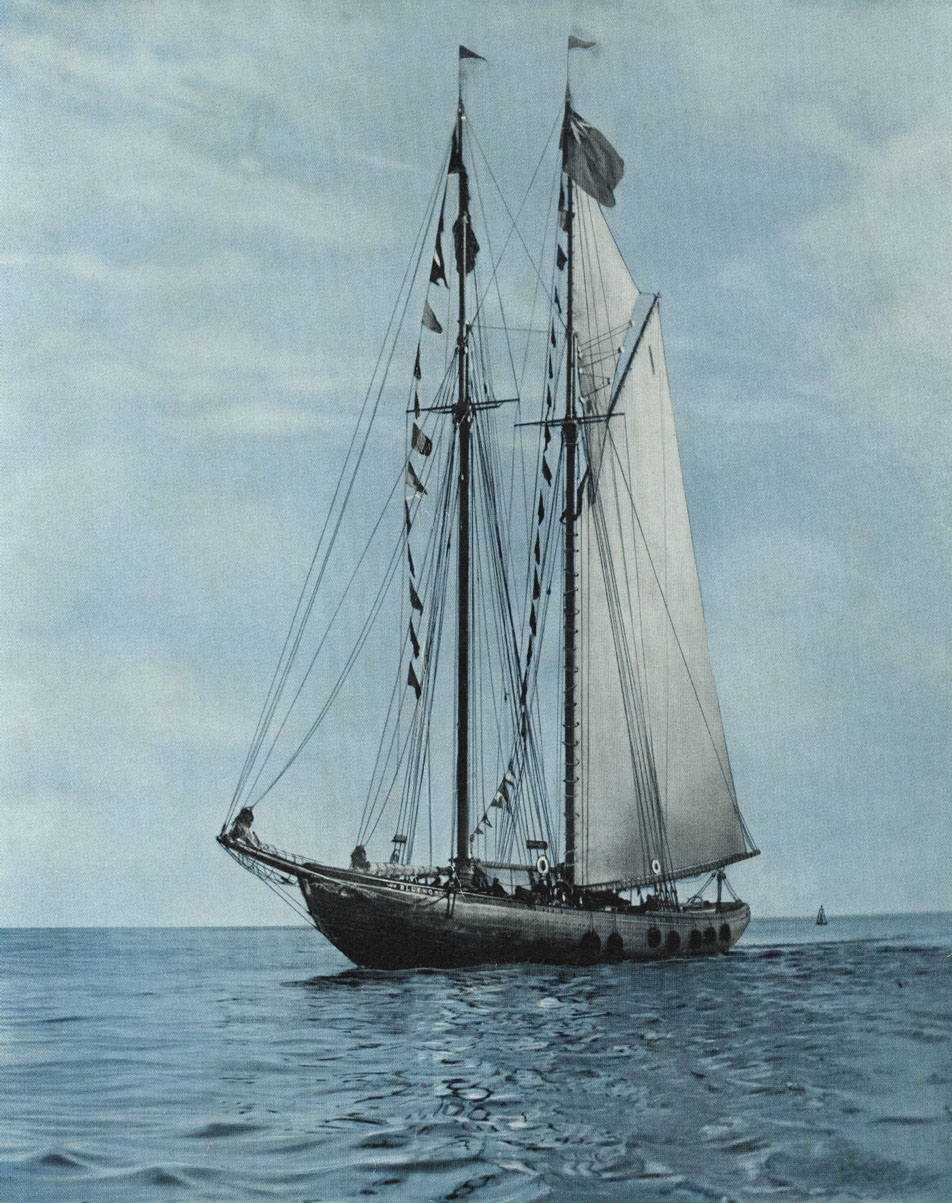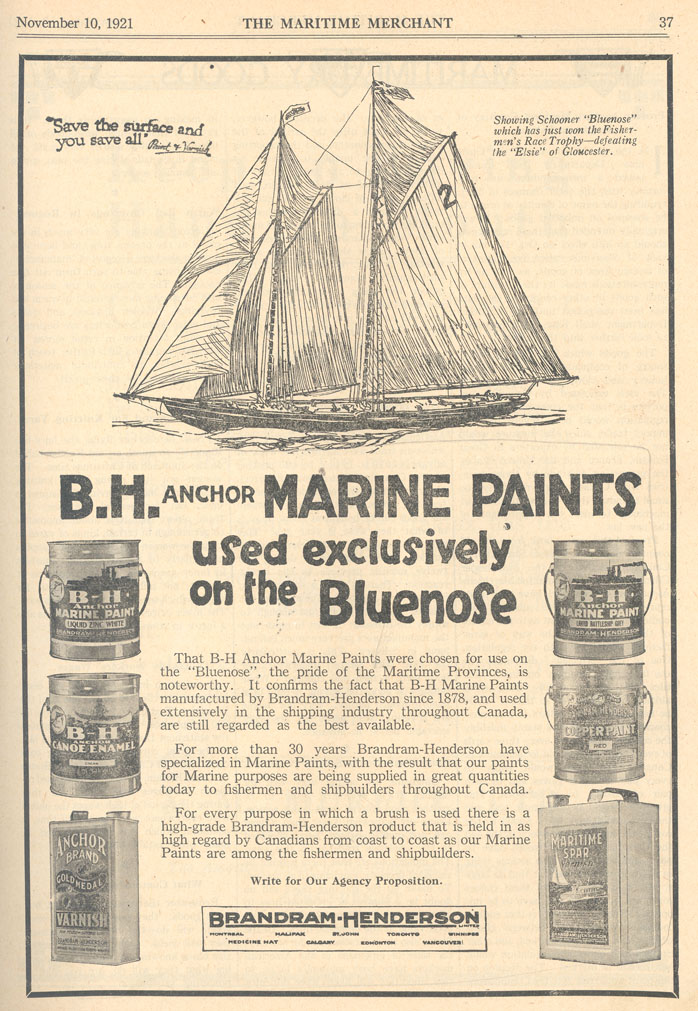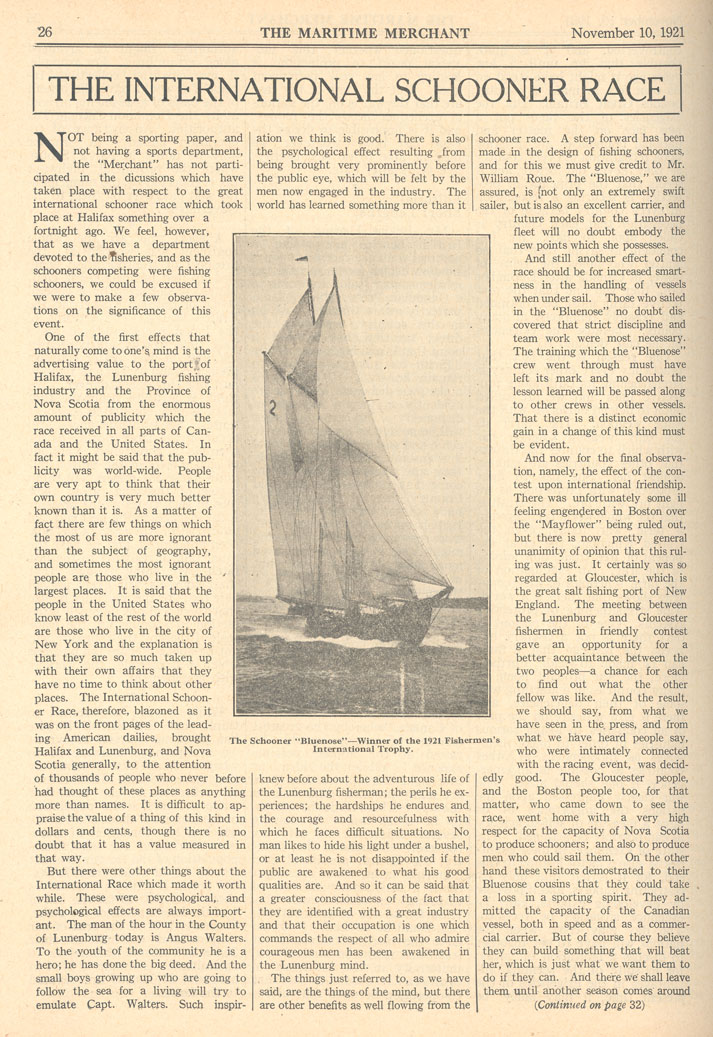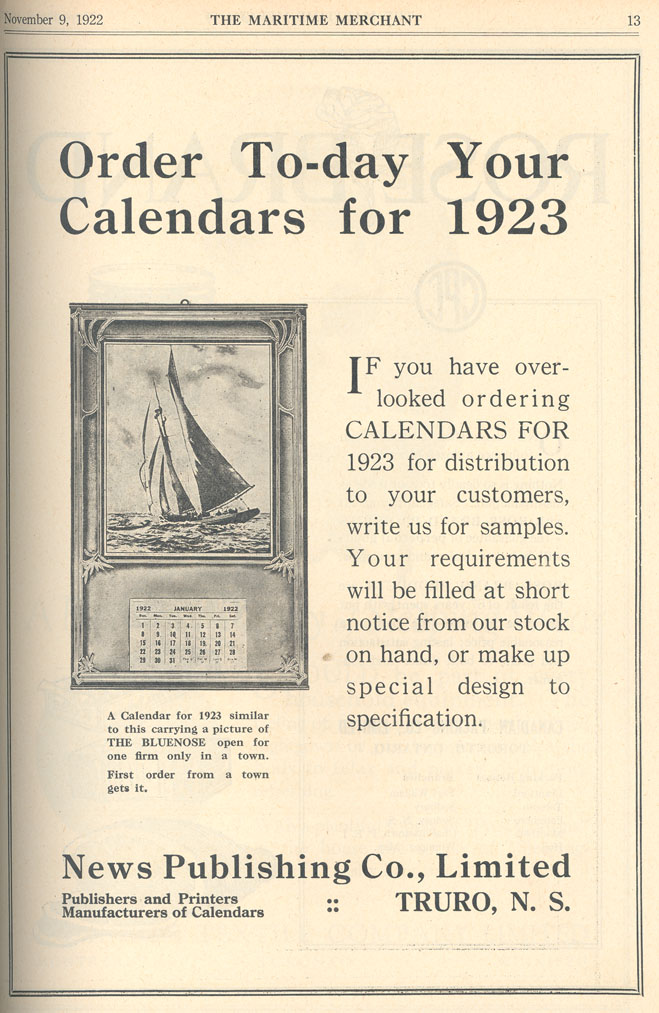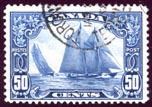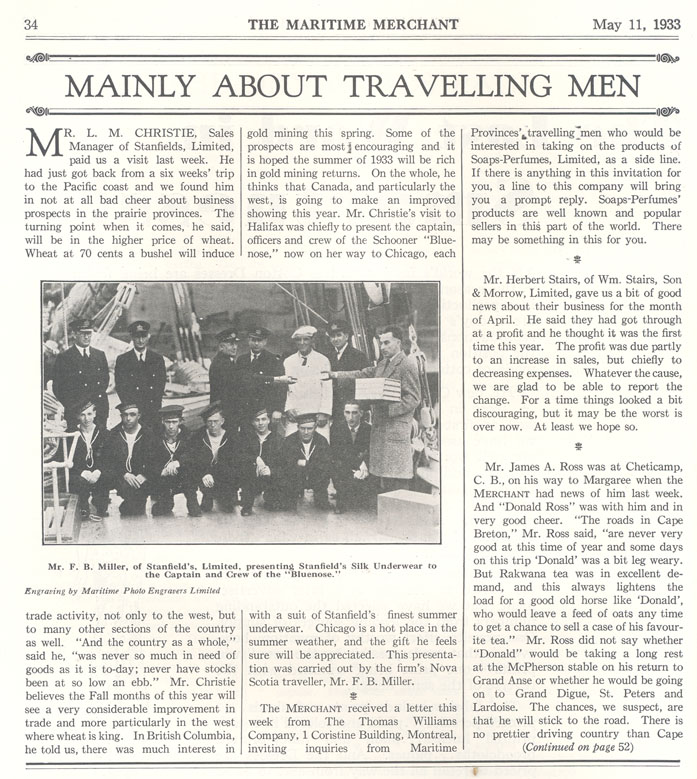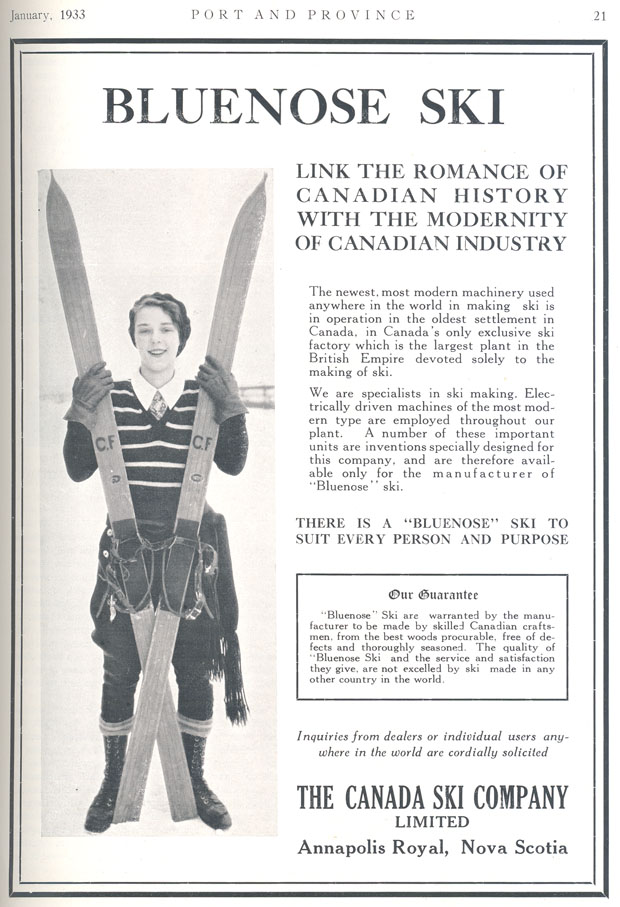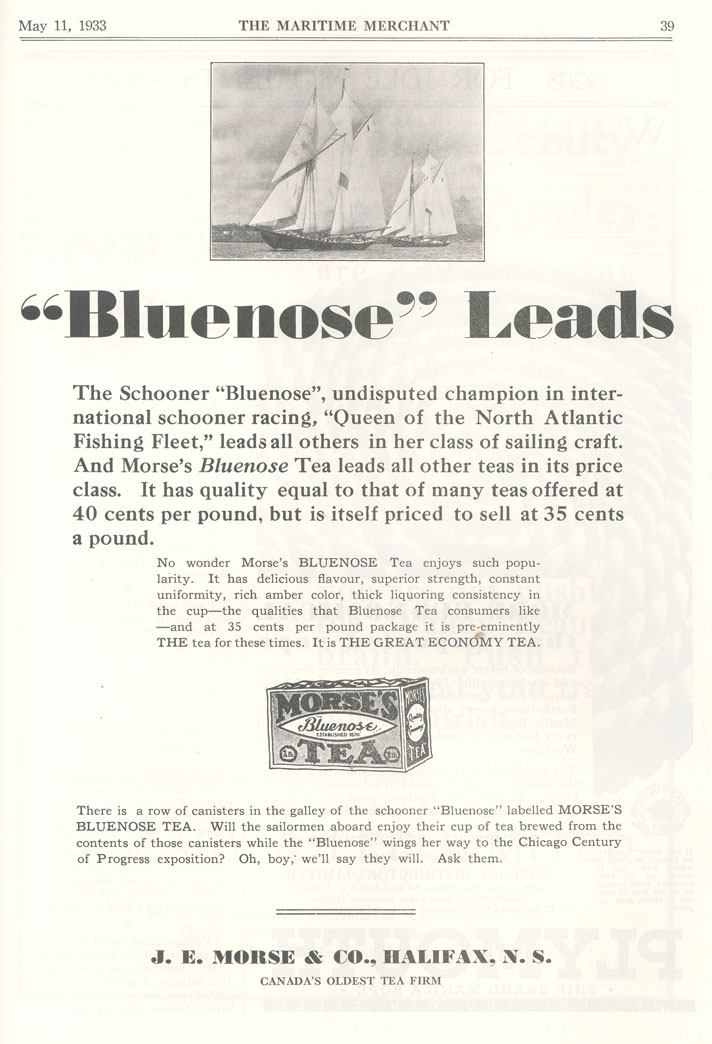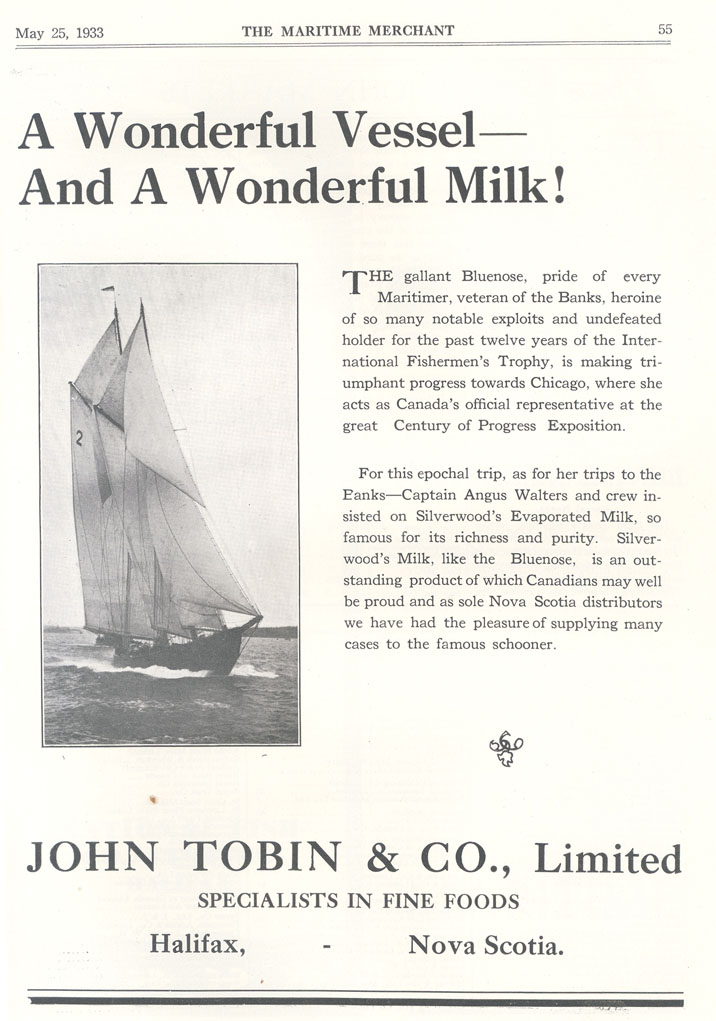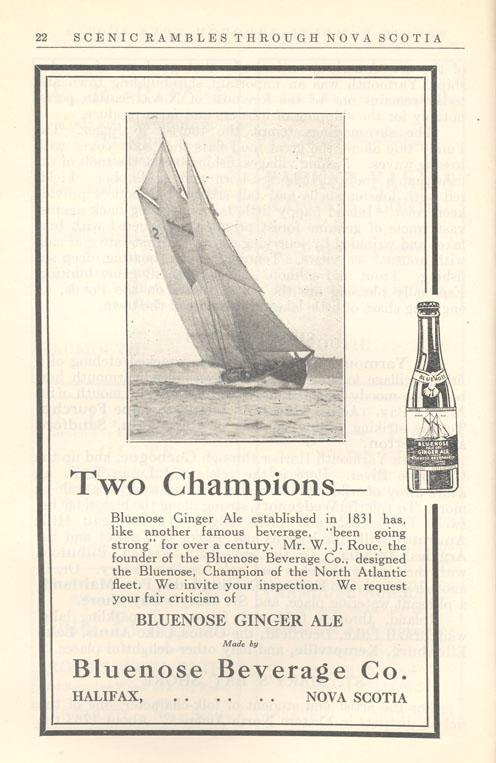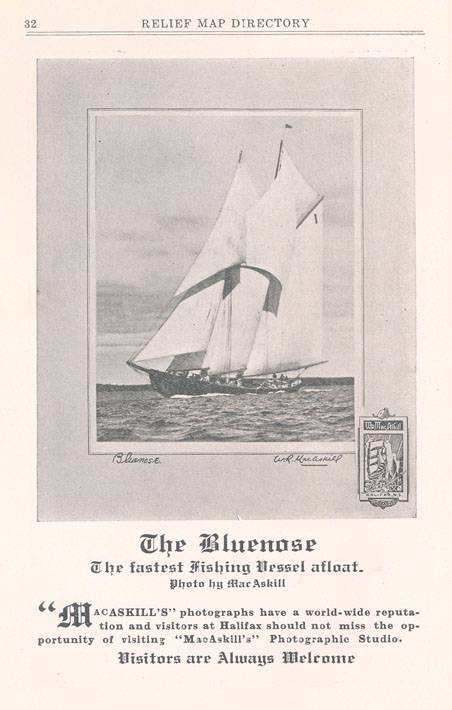Nova Scotia Archives
Bluenose: A Canadian Icon
Bluenose as Canadian Icon
Within two weeks of winning the 1921 International Fishermen's Race, Bluenose was already larger-than-life and well on its way to becoming a Canadian icon. At first the excitement was mostly confined to Atlantic Canada and New England, where it was understood that the victories of the early years "brought Halifax and Lunenburg, and Nova Scotia generally, to the attention of thousands of people who never before had thought of these places as anything more than names."
Angus Walters was hailed as "the man of the hour" and a role model everywhere for youth growing up into the seafaring life. His crew were "courageous men...identified with a great industry," and the annual races were seen as an opportunity for "international friendship" beyond the confines of Nova Scotia. Bluenose's primary role as a Grand Banks schooner was also heavily promoted, because this reinforced Nova Scotia as a continuing player in the offshore fishery, wooden shipbuilding, and international trade — at a time when the province's leadership in all three was beginning to fade.
It was in the depths of the Great Depression that Bluenose grew into a truly national symbol as a floating advertisement for Canada, its people and its maritime heritage. Officially representing the country at the Chicago World's Fair (1933) and at the Silver Jubilee of King George V in England (1935) was a large responsibility for a tiny schooner. It brought out the best in Bluenose and its crew. Tough, elegant, resourceful and dependable, refusing to be defeated in anything, the vessel sailed into the hearts of Canadians as something larger than themselves — and again, at a time when tangible expressions of these values were badly needed. As the Toronto Evening Telegram observed, "Her name is household word. She has knit Canada together."
The schooner's fame was confirmed in 1929, when the Canadian Postal Service issued a distinctive blue stamp known as the 'Fifty-cent Bluenose Commemorative' to honour the vessel's racing record. Cult status was assured in 1937 when the image of an unnamed but unmistakable salt-banker under full sail first appeared on the Canadian dime. The image remains on the coin to this day, and the currency is known to everyone as the 'Bluenose dime'.
Astute product marketing has always followed in Bluenose's wake — corporate interests have been quick to identify and promote the commercial value that exists in the schooner's enduring, indefinable allure. In the early days it was calendars, milk, paint, tea, skis, even underwear. Ginger ale followed soon after, produced and marketed by marine architect William Roué's family bottling company. In the 1940s, native-born photographer Wallace R. MacAskill produced several limited-edition books on Nova Scotia and the sea, featuring the Bluenose and introducing a new generation to the elegance and grace of vessels under sail.
Since the arrival of Bluenose II in the 1960s, commodification has continued — beer, books, clothing, trinkets and related products are constant, virtually subliminal reminders of the indelible image engraved on our collective memory. In the end, Bluenose remains — a symbol, an icon, a lingering reminder of what the world of the Grand Banks fishing schooners was like in all its toughness, speed, elemental danger and terrible beauty.
Results 1 to 15 of 25 from your search:
Bluenose Sails Away, 1921
Date: 1921
Photographer: W.R. MacAskill
Reference: W.R. MacAskill Nova Scotia Archives 20040025
Theme: Bluenose as Canadian Icon
Take back your Golden Fiddles / And we'll beat to open sea
Date: 1921
Photographer: W.R. MacAskill
Reference: W.R. MacAskill Nova Scotia Archives 20040028
Theme: Bluenose as Canadian Icon
Bluenose off McNabs Island 1922
Date: 1922
Photographer: W.R. MacAskill
Reference: W.R. MacAskill Nova Scotia Archives 20040046
Theme: Bluenose as Canadian Icon
Starboard Lookout
Date: 1933
Photographer: W.R. MacAskill
Reference: Maurice Crosby Nova Scotia Archives 20040073
Theme: Bluenose as Canadian Icon
The Famous Bluenose
Date: 1930s
Reference: Photo Collection Nova Scotia Archives Transportation & Communication: Ships: Bluenose
Theme: Bluenose as Canadian Icon
B.H. Anchor Marine Paints used exclusively on the Bluenose
Date: 1921
Reference: Nova Scotia Archives Library: HF/M33: The Maritime Merchant, 10 November 1921, p.37
Theme: Bluenose as Canadian Icon
The International Schooner Race
Date: 1921
Reference: Nova Scotia Archives Library: HF/M33: The Maritime Merchant, 10 November 1921, p.26
Theme: Bluenose as Canadian Icon
Order To-day Your Calendars for 1923
Date: 1922
Reference: Nova Scotia Archives Library: HF/M33: The Maritime Merchant, 9 November 1922, p.13
Theme: Bluenose as Canadian Icon
Stamp, 1929
Date: 1929
Credit: Fisheries Museum of the Atlantic
Reference: Fisheries Museum of the Atlantic FMA
Theme: Bluenose as Canadian Icon
Mr. F.B. Miller, of Stanfield's, Limited, presenting Stanfield's Silk Underwear to the Captain and Crew of the Bluenose
Date: 1933
Reference: Nova Scotia Archives Library: HF/M33: The Maritime Merchant, 11 May 1933, p.34
Theme: Bluenose as Canadian Icon
Bluenose Ski
Date: 1933
Reference: Nova Scotia Archives Library: HE561/P83: Port and Province, January 1933, p.21
Theme: Bluenose as Canadian Icon
Bluenose Leads
Date: 1933
Reference: Nova Scotia Archives Library: HF/M33: The Maritime Merchant, 11 May 1933, p.39
Theme: Bluenose as Canadian Icon
A Wonderful Vessel – And A Wonderful Milk!
Date: 1933
Reference: Nova Scotia Archives Library: HF/M33: The Maritime Merchant, 25 May 1933, p.55
Theme: Bluenose as Canadian Icon
Two Champions
Date: 1930s
Reference: Nova Scotia Archives Library: F91 /N85 /G94 /box 2 no. 23a: Rambles Through Scenic Nova Scotia. A Land of Scenic and Historic Wonders and the Sportsman's Paradise, p.22
Theme: Bluenose as Canadian Icon
The Bluenose – The Fastest Fishing Vessel Afloat
Date: 1935
Photographer: W.R. MacAskill
Reference: Nova Scotia Archives Library: F91 /N85 /G94 /box 2 no. 18: The Relief Map Directory of Nova Scotia, 1935, p.32
Theme: Bluenose as Canadian Icon
